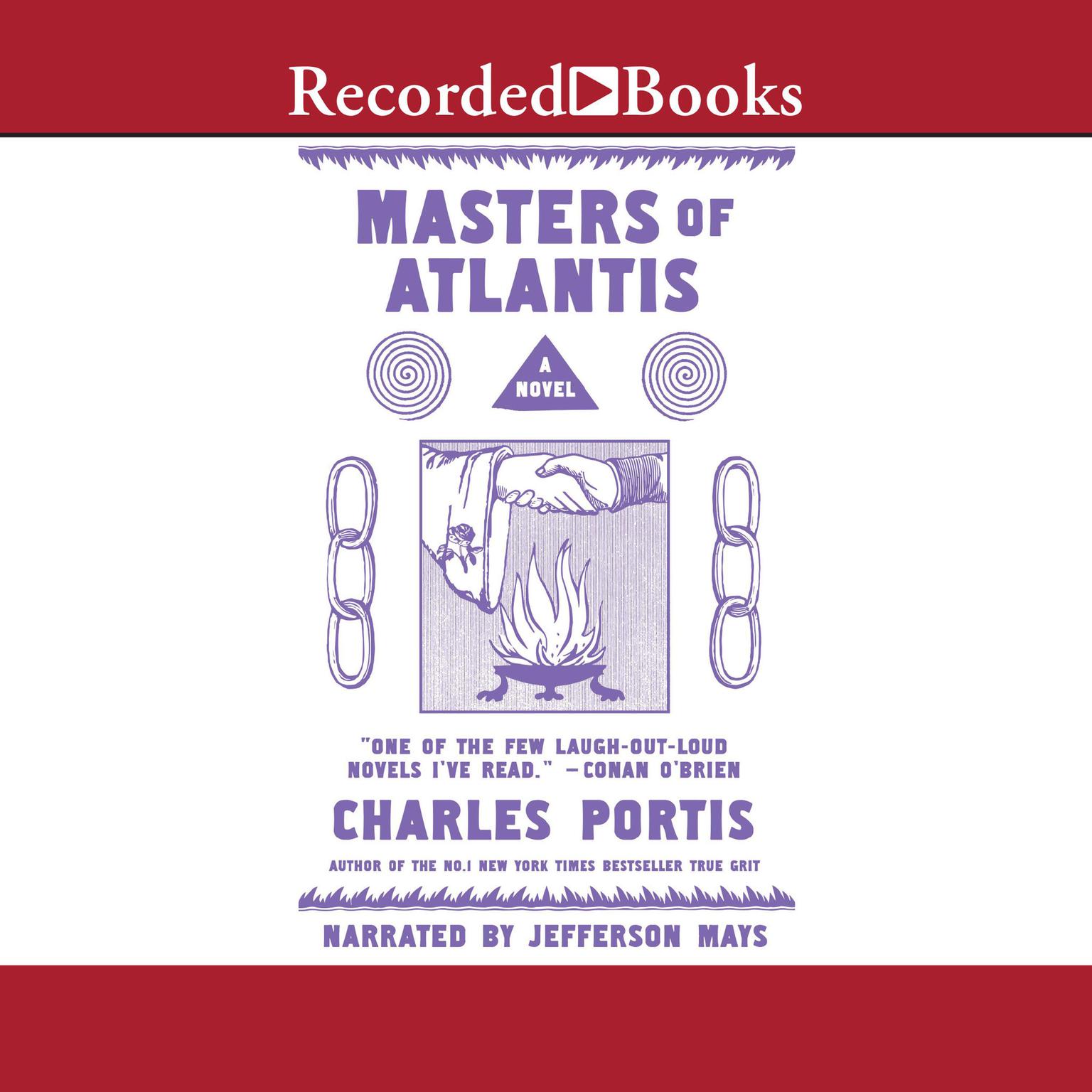 Play Audiobook Sample
Play Audiobook Sample
Masters of Atlantis Audiobook
 Play Audiobook Sample
Play Audiobook Sample
Quick Stats About this Audiobook
Total Audiobook Chapters:
Longest Chapter Length:
Shortest Chapter Length:
Average Chapter Length:
Audiobooks by this Author:
Publisher Description
Lamar Jimmerson is the leader of the Gnomon Society, the international fraternal order dedicated to preserving the arcane wisdom of the lost city of Atlantis. Stationed in France in 1917, Jimmerson comes across a little book crammed with Atlantean puzzles, Egyptian riddles, and extended alchemical metaphors. It's the Codex Pappus - the sacred Gnomon text. Soon he is basking in the lore of lost Atlantis, convinced that his mission on earth is to administer to and extend the ranks of the noble brotherhood.
Download and start listening now!
"What makes an American novel? What makes a great novel? And what makes the Great American Novel? Masters of Atlantis isn't the Great American Novel, that elusive white whale of navel-gazing twentieth century writers, but it is great, and, to judge by the jacket copy on every single one of his books, extremely American. I agree with that sentiment, although I really can't say why. Obviously the fact that it's set in America makes it American in some way, but I think what those reviewers are trying to get at is that there's something about the way Portis presents the events in his book that a foreigner just couldn't replicate. Since plenty of non-natives from have written great books both set in and about the US, it's worth thinking about why Portis' works get grouped in with Mark Twain's and not Vladimir Nabokov's. I think it's mostly due to the brilliantly intimate way that Portis sketches his characters, who usually fall into two main archetypes: credulous yokels and self-confident hustlers. Right from the very first page of this book, when WW1 soldier Lamar Jimmerson is convinced to pay $200 for the secret magisteria of the legendary Gnomon Society by a man who is variously called Nick from Turkey or Mike from Egypt or Jack from Syria or Robert from Malta, Portis sets up a great story with fascinating characters. The actual con that begins the story is over in a matter of pages, but the childlike faith with which Lamar pursues his dreams of being a Gnomon - whose Pythagorean rituals and lore, involving cones and spirals and triangles, are never described completely but alluded to constantly - sustains not only him but at one point thousands of others who flock to his banner. Early on he meets the Englishman Sydney Hen who convinces him to share in his secrets, and with the eventual arrival of diabolically inventive henchman Austin Popper the rest of the book unfolds in hilarious overlapping layers of bullshit, as the Society rises, splinters, and falls, and Popper strikes out on his own all over the map as a demented bibulous überfraud. This is on one level a classic satire of American society, which has always been made up of joiners and mystics and truth-seekers. There is no club or fraternal organization so ridiculous that it can't find a membership of willing dupes; partly this reflects our sheer size, and partly it also reflects the perennial tendency for such a materialistic society to find Higher Meaning in all sorts of things. I think there's a fairly clear continuum from the Great Awakenings through Sixties spiritualism and up to the Jesus Camps of the present day. But what could have been a bitter polemic about American stupidity is a genial, affectionate comedy about lost souls, and though there's some scenes of decay and humiliation that darken the tone of the book, overall Portis knows that America needs its P. T. Barnums, and that a world without them would be much grayer. Popper's drunken wanderings comprise most of the action in the second part of the book, and if you don't laugh out loud when he tries to convince the War Department to use compressed air as a weapon, or when he tries to conjure gold up out of the earth with Golescu the Romanian's bagweed plants, or at any of the other scenes that rank right up there with Huck Finn's encounter with the Duke and the Dauphin, then you simply have no sense of humor whatsoever. Where Portis falls short of someone like Twain is that he doesn't really tackle serious issues like racism, but no book can be all things to all people so it wasn't a problem for me. I hope he stops not writing books, we could use more from him."
— Aaron (5 out of 5 stars)
Masters of Atlantis Listener Reviews
-
" First 100 pages or so were humorous - then the joke became old. "
— Ryan, 2/15/2014 -
" Until I got around to reading True Grit, this was my favorite Charles Portis book. It's typical of his other books (except True Grit) in that a simpleton finds himself in unusual circumstances surrounded by more simpletons. "
— Jim, 2/13/2014 -
" killer hilarious. I miss Squanto. "
— Grace, 2/1/2014 -
" This is one of the funniest books I have ever read, a dead perfect parody of Freemasonry and other lodge-based secret societies. You don't have to be a Mason to appreciate Portis's wit and fantastic writing, though. This is one that I keep trying to get others to read. It's fantastic! "
— Steve, 2/1/2014 -
" This is another great one by Portis. The emphasis here is not on what secret knowledge supposedly is held in the "Codex Pappus" or by the Gnomon brotherhood, but on the quirkiness and obsessions of the secret society founders. Jimmerson, Babcock, Hen and Popper begin their secret society amidst the greatest conflict of the twentieth-century, WWII. However, they have little concern or interest in the war or, actually anything resembling reality. It is this obsession with so-called Telluric Currents (from Atlantis), secret handshakes, cloaked rituals and wearing of ridiculous outfits that Portis concentrates on. I've read four of Portis' five novels, and I rank this one fourth, in this order: True Grit, The Dog of the South, Norwood and Masters of Atlantis. There's even a cameo mention of a now three-hundred pound Dr. Reo Symes (from The Dog of the South). Portis has a knack for these kinds of characters and he reaches a pinnacle with Masters of Atlantis. Highly recommended. "
— Randy, 1/24/2014 -
" Preposterous, absurd, amusing... I like Charles Portis a lot. The characters in Masters of Atlantis didn't grab me like the peanut gallery in his other books, but the comic adventures were grand. "
— Syco, 1/20/2014 -
" This was nicely absurd, with characters as quirky as Ignatius Reilly, but never caused me to laugh out loud. Or even snort. Or even really smirk. "
— Marjorie, 1/19/2014 -
" Masters of Atlantis is supposed to be a spoof on various secret societies in which "other people" participate. The main character, Lamar Jimmerson (an American)is a recently-discharged WWI vet who is swindled by a man who gives him a book, the "Codex Pappus," which is supposed to contain the collective wisdom of Atlantis, and for $200.00, allows him admission to the secret Gnomon society. Although the swindler is never seen again, Jimmerson, with Sydney Hen(an Englishman), starts a American branch of the Gnomon Society in which the swindler becomes a legendary figure, and the Codex Pappus, becomes the society's holy text. While many reviewers thought this book was hilarious,it didn't make me laugh. Its only purpose seemed to be to polk fun at people who Portis perceives to be fools, without offering anything insightful or redeeming about them, and the ease with which he filleted them suggested that the author enjoyed using his knife a little too much. "
— Mary, 1/14/2014 -
" Wasn't motivated to finish this, even though it was an amusing take on goofy, quasi-religious secret societies. Brought to mind Fanny Trollope's commentary on silly American sects. "
— Joyce, 1/11/2014 -
" Long on farce, short on funny (though there were a handful of laughs and a dozen good lines). "
— Douglas, 1/6/2014 -
" Fans of The Crying of Lot 49, The Confederacy of Dunces, and the works of Charles Fort will enjoy this secret history of the Gnomon Society amongst America's misfits, innocents, and con-men. "
— Justin, 12/15/2013 -
" Silly and unfunny, it's hard to believe that this is the work of the author of True Grit. "
— Wayne, 5/1/2013 -
" Conical hats play a big role in this hilarious book. Should be much more well known. Recommended for people who like "Confederacy of Dunces" and not just because that calls to mind a conical hat too. Recommended for people who like comedy, atheism. "
— Dani, 4/20/2013 -
" Funny and sweet and full of life. I was riding my bike around Key West and a first edition of this caught my eye. It was $2 and I gave it to my friend Johnny. My copy is still being "borrowed" after three years by Benzler. Help! "
— Ed, 4/8/2013 -
" This was pretty good, I liked the part where they were growing some plant to harvest gold "
— Kobe, 3/11/2013 -
" My least favorite Portis book, but that's relative and nonetheless I think of it often, so it's probably better than I thought. "
— Teri, 2/8/2013 -
" This may be the funniest book I've ever read. "
— Andy, 12/5/2012 -
" Simply the funniest book ever written. period. "
— Nikolai, 12/4/2012 -
" Charles Portis has a sense of humor that rivals Kurt Vonnegut. Everyone should read this book. "
— Adam, 11/20/2012 -
" Quite possibly the funniest book I've ever read. "
— Ben, 10/25/2012 -
" Makes one feel foolish for ever believing in anything ever, and yet still fun to read. ?????? (Greg shakes his puny fist at Portis while yelling his name threateningly.) "
— Greg, 1/5/2012 -
" Not a riotous read, yet comical through every page. "
— Christina, 12/7/2011 -
" This was a great book - I loved it "
— Kristoffer, 8/17/2011 -
" Brilliant, hilarious and sad "
— Larry, 6/23/2011 -
" Simply wonderful. Everyone in this book believes in arcane knowledge or conspiracies or secrets hidden in the numbers or angles around us. My favorite scene is a Texas legislative hearing that mocks Joe McCarthy and his crew. "
— Sherry, 5/17/2011 -
" Silly and unfunny, it's hard to believe that this is the work of the author of True Grit. "
— James, 5/2/2011 -
" Fans of <em>The Crying of Lot 49</em>, <em>The Confederacy of Dunces</em>, and the works of Charles Fort will enjoy this secret history of the Gnomon Society amongst America's misfits, innocents, and con-men. "
— Justin, 4/7/2011 -
" Funny, sardonic, but not very compelling. "
— Mike, 1/26/2011 -
" Long on farce, short on funny (though there were a handful of laughs and a dozen good lines). "
— Douglas, 11/3/2010 -
" Not a riotous read, yet comical through every page. "
— Christina, 10/1/2010
About Charles Portis
Charles Portis (1933–2020) was an American author best known for his classic Western True Grit and the novel Norwood, both of which were made into major motion pictures. He served in the US Marine Corps during the Korean War and then attended the University of Arkansas. As a reporter, he wrote for the New York Herald Tribune and was also its London bureau chief. His first novel, Norwood, was published in 1966 and True Grit in 1968. His other novels include Masters of Atlantis, The Dog of the South, and Gringos.
About Jefferson Mays
Jefferson Mays, an Earphones Awards-winning narrator, is also an award-winning theater and film actor. In 2004 he won a Tony Award, a Drama Desk Award, an Obie Award, and a Theatre World Award for his solo Broadway performance in I Am My Own Wife, a Pulitzer Prize–winning play by Doug Wright. He holds a BA from Yale College and an MFA from University of California–San Diego.








